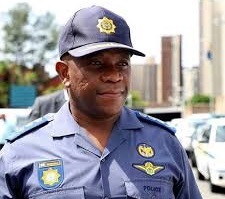
Lt. Gen. Nhlanhla Mkhwanazi Calls for Complete Shutdown of SAPS Crime Intelligence, Exposes Deep Corruption and Political Capture
In a stunning parliamentary testimony, KwaZulu-Natal Police Commissioner Nhlanhla Mkhwanazi declared South Africa’s Crime Intelligence unit a “nest of corruption” infiltrated by cartels and politicians since 2011, calling for its total dismantling amid fresh allegations of sabotage and state capture.
Cape Town, South Africa – October 8, 2025
Lieutenant General Nhlanhla Mkhwanazi, the Acting KwaZulu-Natal Police Commissioner, delivered a bombshell testimony before Parliament’s Ad Hoc Committee on Police Integrity on Monday, October 7, 2025, revealing shocking details about deep-rooted corruption and political interference within the South African Police Service (SAPS) Crime Intelligence division.
Speaking under oath, Mkhwanazi described the once-revered unit as “rotten to the core,” asserting that it has been “infiltrated by drug cartels, compromised by politicians, and repurposed to serve criminal interests rather than national security.”
“Crime Intelligence has long ceased to serve its constitutional purpose. It has become a network of corruption and manipulation that shields criminals and enables political agendas,”
— Lt. Gen. Nhlanhla Mkhwanazi, addressing Parliament’s Ad Hoc Committee
He urged Parliament to consider “shutting down the entire unit and removing all its current personnel” to restore credibility and rebuild South Africa’s intelligence system from scratch.
A Warning of Unrest if Secrets Are Exposed
Mkhwanazi also cautioned that forcing current or former operatives to testify publicly could “open a Pandora’s box” of classified information and potentially trigger unrest of national proportions. He hinted that much of what the public perceives as operational failure is in fact deliberate sabotage engineered to protect high-level political and criminal actors.
According to Mkhwanazi, several major criminal investigations were sabotaged by insiders within Crime Intelligence, leading to the collapse of prosecutions involving influential politicians and business figures. He revealed that arrests were imminent in connection with tampering of evidence and suppression of investigations.
“Some investigations were killed before they began. Files disappeared, leads were destroyed, and witnesses silenced. This is not incompetence, it’s orchestrated obstruction,” Mkhwanazi testified.
Tense Exchanges and Parliamentary Disruption
The hearing itself was marked by sharp procedural disputes. MPs clashed with Mkhwanazi after rejecting his supplementary statement, citing late submission. Heated exchanges ensued, with several committee members accusing him of “grandstanding,” while others defended his courage in confronting entrenched corruption.
Despite the tension, Mkhwanazi stood firm, reiterating that his testimony was not a political attack but a patriotic warning that law enforcement had become “weaponized by politics and organized crime.”
“We are no longer fighting criminals, we are working beside them. This must end,” he said.
Historical Context: A Decade of Decay in Crime Intelligence
Mkhwanazi’s revelations echo long-standing concerns first exposed during the Richard Mdluli era (2011–2012), when the former Crime Intelligence boss was accused of plundering the unit’s secret slush fund, appointing relatives to state positions, and using intelligence resources for personal and political gain.
Despite multiple corruption charges filed in 2011, most cases languished in court for years amid allegations of interference by senior politicians. The Institute for Security Studies (ISS) warned in 2024 that the unit remained “a bastion of political patronage and criminal infiltration.”
Political Shadows and the ‘Farmgate’ Scandal
Mkhwanazi’s remarks also revive debate about political manipulation of law enforcement under successive administrations. While not directly naming any sitting official, analysts have connected his warnings to broader concerns about executive interference, including the slow-moving probe into President Cyril Ramaphosa’s “Phala Phala” or “Farmgate” scandal.
In that case, over $580,000 in U.S. cash was stolen from a sofa at Ramaphosa’s Limpopo farm in 2020, prompting allegations of money laundering and misuse of state security agencies to cover up the incident. Though prosecutors declined to charge the president in 2024 citing “insufficient evidence”,
Critics argue that the delayed and limited investigation exemplified how politically sensitive cases are often buried within the intelligence and prosecutorial system.
Civil rights groups, including Corruption Watch and OUTA, have repeatedly called for the depoliticization of the intelligence and policing architecture, warning that the current setup “protects the powerful while criminalizing whistleblowers.”
A System Beyond Repair?
Security experts interviewed by Peoples Chronicles say Mkhwanazi’s call for dismantling Crime Intelligence is unprecedented, but perhaps necessary
Mkhwanazi’s testimony, though polarizing, has reignited public debate about the integrity of South Africa’s security establishment. It also raises urgent questions: Who really controls state intelligence, and how deep does the rot go?
“We cannot rebuild trust while the same people who destroyed it remain in charge,” – Mkhwanazi concluded.
“The house cannot be repaired from within. It must be demolished and rebuilt with integrity at its foundation.”
Looking Ahead
As Parliament reconvenes later this week, the Ad Hoc Committee is expected to summon former Crime Intelligence officials and senior police executives implicated in past corruption scandals. Mkhwanazi’s revelations have already prompted calls from civil society for a judicial commission of inquiry into the state of South Africa’s intelligence network.
For a nation already reeling from crime, economic instability, and political mistrust, his testimony may mark a turning point or a reckoning long overdue.